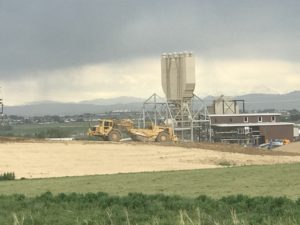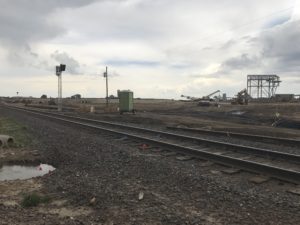DENVER — The Colorado Court of Appeals on Nov. 7 heard arguments from both sides of a controversial land use case in unincorporated Weld County.
The case involves an asphalt plant that was approved by the Board of Weld County Commissioners more than two years ago. The court will decide whether to overturn their decision.
The 131-acres in question is zoned agricultural and under Weld codes is considered to be prime farmland. It lies just 500 feet from houses, and is being challenged by those homeowners who vowed from the initial approval to fight concrete giant Martin Marietta (MM).

The appellants, which are made up of eight nearby neighbors and businesses, argue commissioners arbitrarily allowed the plant, violating the county’s use by special review (USR) regulations. They want the court to overturn the decision.
The battle has been ongoing since Aug. 12, 2015 when commissioners agreed to allow MM to construct the plant, which is located just off Interstate 25 and U.S. 34, that at full build out would include:
- As much as 600,000 tons of asphalt produced yearly.
- As much as 800,000 tons of concrete produced yearly.
- A concrete crusher.
- Asphalt recycling.
- Up to 2 million tons per year of aggregate product.
- A rail spur for delivery of aggregate to the site amounting to up to 150 trains per year.
Weld’s planning department and the Weld County Planning Commission recommended against the plant, saying it would have no relationship to or dependence on agriculture, one of the needed reasons to allow heavy industry within prime farmland under Weld’s land use codes. They also cited inadequate roads and the impact on surrounding properties.
Additionally, the towns of Windsor and Johnstown, the cities of Greeley and Loveland, and Larimer County said the plant did not fit their long-term growth plans and was incompatible with surrounding land use. But the commissioners ruled against the recommendations, saying there were more than three dozen mitigating factors that allowed its use under Weld’s code.
The residents initially appealed the case to a Weld District Court, and on Aug. 9, 2016, Judge Todd Taylor ordered the case remanded back to the commissioners to make further findings. On Jan. 27, 2017, Taylor upheld the commissioners decision, saying vigorous opposition to a land use case does not satisfy the arguments that the commissioners acted outside their quasi-judicial requirements.
“The board’s approval of MM’s application is supported by evidence in the record,” Taylor wrote in his decision. “…The board also made adequate findings, with record support, that MM’s proposed use is compatible with the existing surrounding land uses and with future development of the area.”
However, the appellants argued just the opposite in front of the three-judge panel of the Colorado Court of Appeals.
Attorney for the appellants, Mark Lacis of the Denver-based firm Ireland Stapleton, said judges have two reasons they should overturn the county’s decision.
The first reason is that before a USR can be approved under Weld County Code, the applicant must demonstrate compliance with nine mandatory requirements. Lacis said there was no competent evidence for four of the requirements, namely that:
- MM failed to provide competent evidence that its use is compatible with the existing surrounding uses.
- That MM made a diligent effort to preserve prime farmland.
- That the use will not violate the residential noise standard.
- That the proposed use is directly related to agriculture.
“The absence of any one of these elements, mandates reversal,” Lacis said, stressing that both the planning department and commission concluded it was incompatible. “No matter what mitigation efforts are put into place.”
The court questioned whether the site configuration helped meet the requirement to preserve prime farmland.
Lacis argued Weld code requires preservation of prime farmland in two places, both when they select the site and when they are configuring the setup on the site.
“They are arguing that they are satisfying the first requirement for site selection by satisfying the second requirement for site configuration,” Lacis said. “…There is nothing in the record that shows that they even knew it was prime farmland when they actually selected the site.”
Lacis also argued that if a heavy industrial use of land didn’t need to show a direct relationship to agriculture it would simply be a rezone rather than a use by special review.
“This use creates an island of heavy industrial use within a sea of farms and single-family homes,” Lacis said. “As such this constitutes defacto spot zoning which merits reversal.”
Mark Mathews of Denver-based Brownstein Hyatt Farber Schreck, representing MM, said Weld’s code for land use includes the word intended.
“I would submit that current land use zoning designations is the best evidence of the intent of a piece of property,” Mathews said. “It was well within the discretion of the board to not just look at adjacent parcels, but to go out a mile in each area in making a compatibility determination.”
Judge Russell Carparelli asked if the court were to side with Mathews’ argument, what the future zoning would look like.
“Are we to understand then that a compatibility and future you are talking about would include putting a lot of USRs into agricultural zoned areas because the adjacent area is industrial?” Carparelli asked.
Mathews didn’t directly answer the question, instead he reverted back to Taylor’s decision, which said MM’s use is an example of a compatible use listed in Weld’s code.
“It clearly meets the intent of the (agricultural) zoning district because it is an example under permissible USR uses,” Mathews said.
Mathews said that the appellants’ arguments were all based on other factors such as long-range planning documents, development codes and additional requirements added above of the minimum USR criteria.
“Appellants are trying to confuse to fundamentally different things,” Mathews said. “The USR criteria, and that is what guides the board as opposed to an operational standard.”
The second reason appellants argued is that while the order was on remand from Judge Taylor between Aug. 9, 2016 and Oct. 3, 2016 when Weld County submitted its amended resolution, the applicant and the county engaged in improper ex parte communications.
Ex parte communication is communication that exists between a judge and parties to case before the judge. In the case the Weld Commissioners act as a judge and MM and the appellants are the parties to the case.
Lacis said Weld County and MM admitted to such communications and asked the court to find in appellants favor that ex parte communications did exist after Taylor sent the issue back to the county for further review.
“MM reverted to the position of applicant and he county to the position of quasi-judicial decision maker,” Lacis said. “If an applicant in a quasi-judicial body cannot engage in ex parte communications when an application is pending they similarly should not be allowed to engage in such communications when a case is remanded.”
Weld County Attorney Bruce Barker admitted there was communication between MM and the county after Taylor remanded the case back to the county. Barker argued, however, that ex parte communications laws do not apply when a case is remanded back for more review.
“There is no law that the appellants cite that says what they think it says,” Barker said, “which is that I have an obligation to stop the communication with my co-defendants if there is a remand.”
The court took exception to Barker’s claim.
“Isn’t the county acting as a judicial officer such as us if we remand something back to the trial court if there has been communication about the case between the counsel and the judge, isn’t that a problem?” Judge Diana Terry asked Barker.
Barker said no, it was not a problem.
“In the judicial sense it’s not a problem?” the judge reinforced.
Barker insisted it was not.
“We are not taking evidence,” Barker said, saying a decision had already been made in this case.
“But you were supposed to make additional findings on remand,” the judge countered.
Barker then tried to argue the communications didn’t matter because the findings didn’t change. He was unable finish because he ran out of time.
It is unknown when the court will come back with its decision, but the hearing was what is known as a de novo hearing, meaning the court is determining if the development was allowed because it is in compliance with code. They review all the information, with fresh eyes, from the beginning.
This is the last step in the process where either side has a guaranteed right to appeal. The losers in this appeal can appeal it to the Colorado Supreme Court, but it would have to be to resolve constitutional questions and the court could refuse to hear it.
 If the court rules to reverse the USR permit, MM will have to cease operations and return the land to the condition it was in on Aug. 11, 2015, the day before the initial decision. It is not clear if MM would have a case against Weld County to recoup monetary loses.
If the court rules to reverse the USR permit, MM will have to cease operations and return the land to the condition it was in on Aug. 11, 2015, the day before the initial decision. It is not clear if MM would have a case against Weld County to recoup monetary loses.
MM did send the county a letter in December of 2015 acknowledging they accepted the risk involved in continuing the development process
“Based on our discussion … the county agrees that it can and will continue to review, process and approve the various components of the project according to the county’s normal process and code, so long a MM acknowledges that such continued action is at its own risk. MM acknowledges that, in the event the litigation results in an invalidation of the approval of its use by special review permit for the project, that it may have to cease activity, or remove improvements that have been installed pursuant to approved permits.”
However, MM has made improvements off property as part of the agreement, such as a traffic light at Weld County Road 13 and US 34 as well as road improvements in the area of its operation. It is unclear whether they will have to remove those.


